直接英语间接引语
- 格式:doc
- 大小:35.50 KB
- 文档页数:6
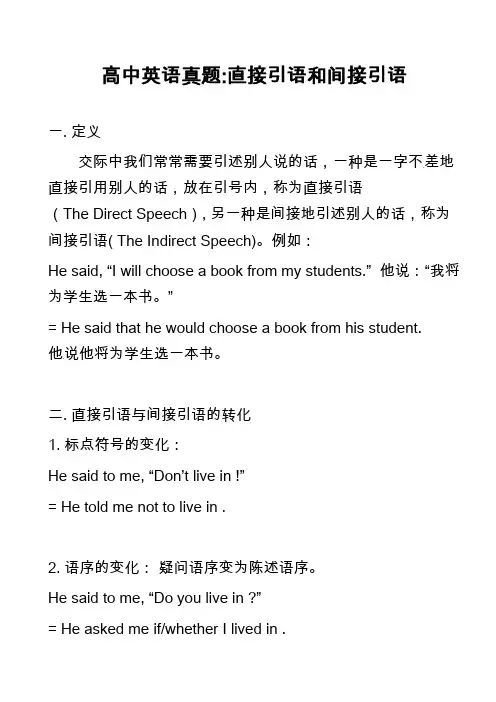
高中英语真题:直接引语和间接引语一. 定义交际中我们常常需要引述别人说的话,一种是一字不差地直接引用别人的话,放在引号内,称为直接引语(The Direct Speech), 另一种是间接地引述别人的话,称为间接引语( The Indirect Speech)。
例如:He said, “I will choose a book from my students.”他说:“我将为学生选一本书。
”= He said that he would choose a book from his student.他说他将为学生选一本书。
二. 直接引语与间接引语的转化1. 标点符号的变化:He said to me, “Don’t live in !”= He told me not to live in .2. 语序的变化:疑问语序变为陈述语序。
He said to me, “Do you live in ?”= He asked me if/whether I lived in .3. 动词的变化: say (to) 在陈述句中多变为tell等词,在疑问句中多变为ask等词,在祈使句中表示命令多变为tell, order 等词,表请求时多变为ask等词。
He said to me, “Could you please live in ?”= He asked me if/whether I could live in .= He asked me to live in .4. 连接词的变化:He said to me, “I live in .”= He told me that he lived in .2. 一般(选择,反意)疑问句用if 或whether连接He said to me,= He asked me if/whether I lived in .He asked me,= He asked me if/whether I lived in London o r .He asked me,= He asked me if/whether I lived in .5. 时态的变化:He said, “I live in .”= He said that he lived in .He said, “I am living in now.”= He said that he was living in then.He said, “I will live in next year.”=He said that he would live in thenext year.He said, “I lived in for years.”= He said that he had lived in forHe said, “The earth turns around t he sun.”= He said that the earth turns around the sun.He said, “I would like to live in .”= He said that he would like to livein .He said, “I used to live in .”= He said that he used to live in .6. 人称代词的变化:7. 指示代词,地点副词,动词, 时间状语的变化ain tonight.”= She said that he would go there again that night.He asked me, “Did you leave yesterday morning or the day before yesterday?”= He asked me if I had left themorning before or two days before.练习单项选择1. He asked ____ for the violin.Did I pay how muchB. I paid how muchC. how much did I payD. how much I paid2. Someone is ringing the doorbell. Go and see _____.who is he B. who he is C. who is itD. who it is3. Can you tell me ____?how good is his spoken EnglishB. how well his spoken English isC. how well he speaks EnglishD. how good he can speak English4. He said that he had bought the jacket____.before three days B. three days beforeC. three days agoD. last week5. Did you say_____?A. that what he said was trueB. that it w as true that he saidC. what did he say was trueD. what he said it was true6. Please tell me ____ from.where do you comeB. where you comeC. where you will comeD. there you come7. Ask her ____ come with us.if she willB. if or not she willC. that if she willD. whether will she8. The driver said that he ____ pick ____ a passenger at . will, upB. would, upC. will, outD. would, out9. He said he ___ in 1993.has born B. had been bornC. had bornD. was born10. John ___ me he was going to help me with my English.A. explainedB. spokeC. toldD. said11. He asked me _______ I would go to by air the next day.A. that ofB. ifC. that whetherD. how12. Mother asked the youngest kid ________ with his toy car.A. what the matter wasB. what was the matterC. what the matter isD. what is the matter1-5. DDCBA 6-10 BABDC 11-12 BB二. 将下列直接引语改写成间接引语1. He said, “I have been here about ten times.”2. Mary said, “I have sold my house in .”3. The man said, “Smoking is strictly forbidden here.”4. Ann said, “She moved to in 1956.”5. Mr. Black said, “We started learning Chinese last month.”6. Mary said, “Why didn’t you stop here yesterday?”7. Shaw said to Ann, “Your brother will give you a nice gift.”8. My wife said to me, “Don’t sleep with the window open.”9. I asked Tom, “Do you live on the fourteenth floor or the fifte enth floor?”10. He asked, “Should I go with you, Linda?”11. The teacher said to the students, “Water boils at 100℃.”12. The nurse said to Grey, “Leave the ward quietly.”13. He said, “How lovely the house is!”14. “Would you buy me some stamps?” he said to me.15. “Who left the banana skin on my desk?” said Cathy.16. “Are you leaving today or tomorrow morning?” said his se cretary.17. She said, “How long will it take me to fly to that city?”18. “Where were you last night?” she said.19. “It is foggy today,” I said.20. He said, “I must go at once.”Key1. He said that he had been there about ten times.2. Mary said that she had sold her house in .3. The man said that smoking was strictly forbidden there.4. Ann said that she moved to in 1956.5. Mr. Black said that they had started learning Chinese the m onth before.6. Mary asked why I hadn’t stopped her the day before.7. Shaw told Ann that her brother would give her a nice gift.8. My wife told me not to sleep with the windows open.9. I asked Tom whether he lived on the fourteenth floor or the fifteenth floor.10. He asked Linda whether he should go with her.11. The teacher told the students that water boils at 100℃.12. The nurse told Grey to leave the ward quietly.13. He said how lovely the house was.14. He asked me to buy some stamps for him.15. Cathy asked who had left the banana skin on her desk.16. His secretary asked whether he was leaving that day or the next morning.17. She asked how long it would take her to fly to that city.18. She asked where I had been the night before.19. I said that it was foggy that day.20. He said that he would have to go at once.直接引语和间接引语一. 定义交际中我们常常需要引述别人说的话,一种是一字不差地直接引用别人的话,放在引号内,称为直接引语(The Direct Speech), 另一种是间接地引述别人的话,称为间接引语( The Indirect Speech)。
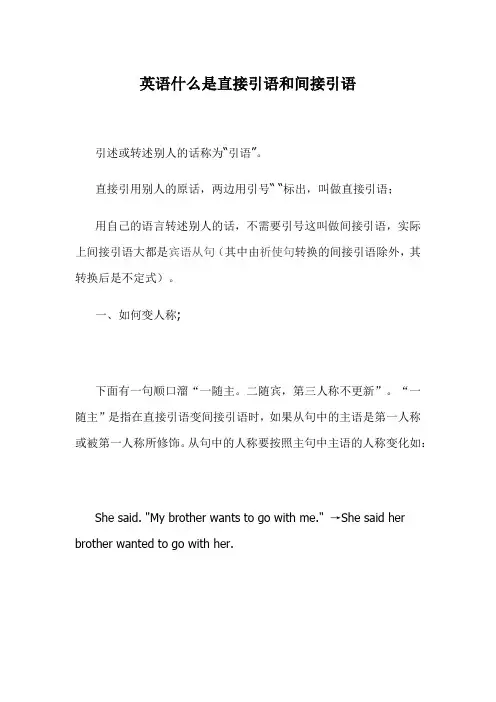
英语什么是直接引语和间接引语引述或转述别人的话称为“引语”。
直接引用别人的原话,两边用引号“ “标出,叫做直接引语;用自己的语言转述别人的话,不需要引号这叫做间接引语,实际上间接引语大都是宾语从句(其中由祈使句转换的间接引语除外,其转换后是不定式)。
一、如何变人称;下面有一句顺口溜“一随主。
二随宾,第三人称不更新”。
“一随主”是指在直接引语变间接引语时,如果从句中的主语是第一人称或被第一人称所修饰。
从句中的人称要按照主句中主语的人称变化如:She said. "My brother wants to go with me." →She said her brother wanted to go with her.“二随宾”是指直接引语变间接引语时,若从句中的主语及宾语是第二人称。
或被第二人你所修饰。
从句中的人称要跟引号外的主句的宾语一致。
如果引号外的主句没有宾语。
也可以用第一人称,如:He said to Kate. "How is your sister now?" →He asked Kate how her sister was then。
“第三人称不更新”是指直接引语变间接引语时。
如果从句中的主语及宾语是第三人称或被第三人称所修饰从句中的人称一般不需要变化如:Mr. Smith said: "Jack is a good worker。
"→Mr. Smith said Jack was a good worker。
二、如何变时态:直接引语在改为间接引语时、时态需要做相应的调整。
现在时它需改为过去时态;过去时态改为完成时;过去完成时则保留原来的时态。
如:1) She said. "I have lost a pen." →She said she had lost a pen.2) She said. "We hope so." →She said they hoped so.3) She said. "He will go to see his friend。
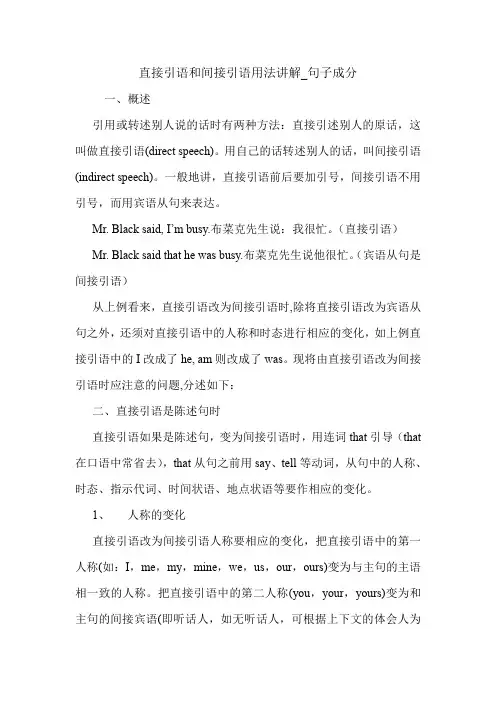
直接引语和间接引语用法讲解_句子成分一、概述引用或转述别人说的话时有两种方法:直接引述别人的原话,这叫做直接引语(direct speech)。
用自己的话转述别人的话,叫间接引语(indirect speech)。
一般地讲,直接引语前后要加引号,间接引语不用引号,而用宾语从句来表达。
Mr. Black said, I’m busy.布菜克先生说:我很忙。
(直接引语)Mr. Black said that he was busy.布菜克先生说他很忙。
(宾语从句是间接引语)从上例看来,直接引语改为间接引语时,除将直接引语改为宾语从句之外,还须对直接引语中的人称和时态进行相应的变化,如上例直接引语中的I改成了he, am则改成了was。
现将由直接引语改为间接引语时应注意的问题,分述如下:二、直接引语是陈述句时直接引语如果是陈述句,变为间接引语时,用连词that引导(that 在口语中常省去),that从句之前用say、tell等动词,从句中的人称、时态、指示代词、时间状语、地点状语等要作相应的变化。
1、人称的变化直接引语改为间接引语人称要相应的变化,把直接引语中的第一人称(如:I,me,my,mine,we,us,our,ours)变为与主句的主语相一致的人称。
把直接引语中的第二人称(you,your,yours)变为和主句的间接宾语(即听话人,如无听话人,可根据上下文的体会人为确定一个人称)相一致的人称。
直接引语中的第三人称(he,him,his,she,her,hers,it,its,they,their,theirs,them)变为间接引语时,人称不变。
He said , I like it very much. 他说:我非常喜欢它。
He said that he liked it very much. 他说他非常喜欢它。
(I改为he, it 不变)He said, You told me this story.他说:你给我讲过这个故事。
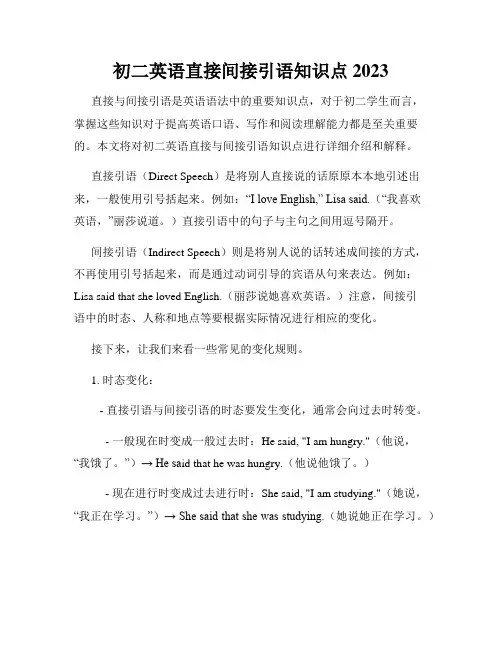
初二英语直接间接引语知识点2023直接与间接引语是英语语法中的重要知识点,对于初二学生而言,掌握这些知识对于提高英语口语、写作和阅读理解能力都是至关重要的。
本文将对初二英语直接与间接引语知识点进行详细介绍和解释。
直接引语(Direct Speech)是将别人直接说的话原原本本地引述出来,一般使用引号括起来。
例如:“I love English,” Lisa said.(“我喜欢英语,”丽莎说道。
)直接引语中的句子与主句之间用逗号隔开。
间接引语(Indirect Speech)则是将别人说的话转述成间接的方式,不再使用引号括起来,而是通过动词引导的宾语从句来表达。
例如:Lisa said that she loved English.(丽莎说她喜欢英语。
)注意,间接引语中的时态、人称和地点等要根据实际情况进行相应的变化。
接下来,让我们来看一些常见的变化规则。
1. 时态变化:- 直接引语与间接引语的时态要发生变化,通常会向过去时转变。
- 一般现在时变成一般过去时:He said, "I am hungry."(他说,“我饿了。
”)→ He sa id that he was hungry.(他说他饿了。
) - 现在进行时变成过去进行时:She said, "I am studying."(她说,“我正在学习。
”)→ She said that she was studying.(她说她正在学习。
)- 一般过去时不变:They said, "We went to the park yesterday."(他们说,“我们昨天去公园了。
”)→ They said that they went to the park yesterday.(他们说他们昨天去公园了。
)2. 人称变化:- 直接引语与间接引语的人称也需要发生变化。
- 第一人称变成第三人称:He said, "I am happy."(他说,“我很快乐。
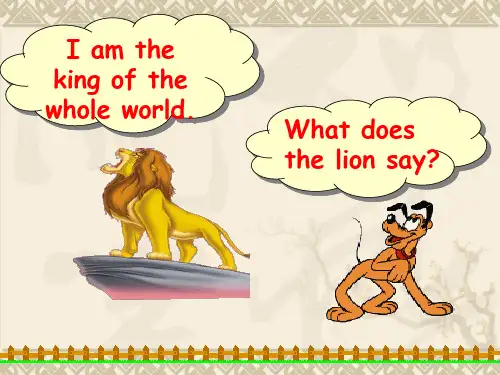
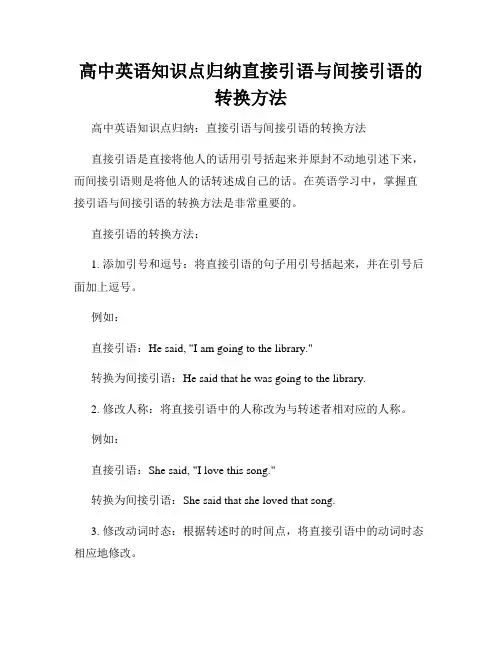
高中英语知识点归纳直接引语与间接引语的转换方法高中英语知识点归纳:直接引语与间接引语的转换方法直接引语是直接将他人的话用引号括起来并原封不动地引述下来,而间接引语则是将他人的话转述成自己的话。
在英语学习中,掌握直接引语与间接引语的转换方法是非常重要的。
直接引语的转换方法:1. 添加引号和逗号:将直接引语的句子用引号括起来,并在引号后面加上逗号。
例如:直接引语:He said, "I am going to the library."转换为间接引语:He said that he was going to the library.2. 修改人称:将直接引语中的人称改为与转述者相对应的人称。
例如:直接引语:She said, "I love this song."转换为间接引语:She said that she loved that song.3. 修改动词时态:根据转述时的时间点,将直接引语中的动词时态相应地修改。
例如:直接引语:He said, "I will visit my grandparents next week."转换为间接引语:He said that he would visit his grandparents the following week.4. 修改时间状语:将直接引语中的时间状语根据转述时的具体情况进行修改。
例如:直接引语:She said, "I saw him yesterday."转换为间接引语:She said that she had seen him the day before.间接引语的转换方法:1. 去除引号和逗号:去除直接引语中的引号和逗号。
例如:间接引语:She said that she loved that song.2. 恢复原人称:根据直接引语的原人称,将间接引语中的人称恢复到原来的形式。
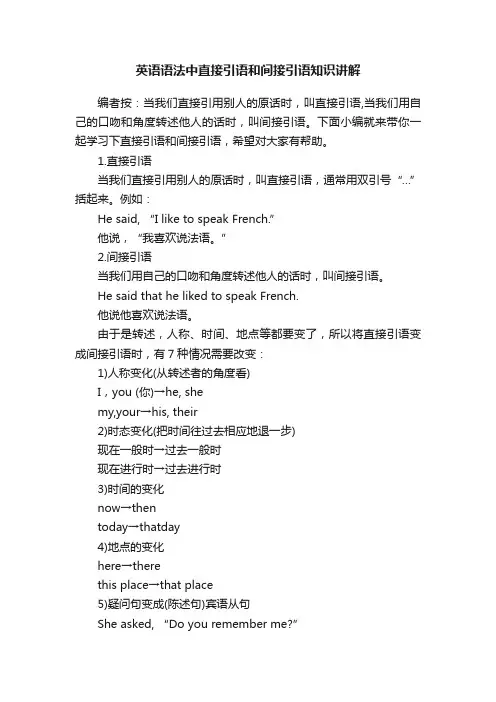
英语语法中直接引语和间接引语知识讲解编者按:当我们直接引用别人的原话时,叫直接引语,当我们用自己的口吻和角度转述他人的话时,叫间接引语。
下面小编就来带你一起学习下直接引语和间接引语,希望对大家有帮助。
1.直接引语当我们直接引用别人的原话时,叫直接引语,通常用双引号“…”括起来。
例如:He said, “I like to speak French.”他说,“我喜欢说法语。
”2.间接引语当我们用自己的口吻和角度转述他人的话时,叫间接引语。
He said that he liked to speak French.他说他喜欢说法语。
由于是转述,人称、时间、地点等都要变了,所以将直接引语变成间接引语时,有7种情况需要改变:1)人称变化(从转述者的角度看)I,you (你)→he, shemy,your→his, their2)时态变化(把时间往过去相应地退一步)现在一般时→过去一般时现在进行时→过去进行时3)时间的变化now→thentoday→thatday4)地点的变化here→therethis place→that place5)疑问句变成(陈述句)宾语从句She asked, “Do you remember me?”→She asked whether her remembered her.6)祈使句变成不定式或者宾语从句Jack said, “Sit down here.”→Jack asked him to sit down there.7)感叹句转换时的变化He said, “How beautiful this place is!”→He said that place was so beautiful.本文作者:丹丹英语(公众号:英语语法学习)。
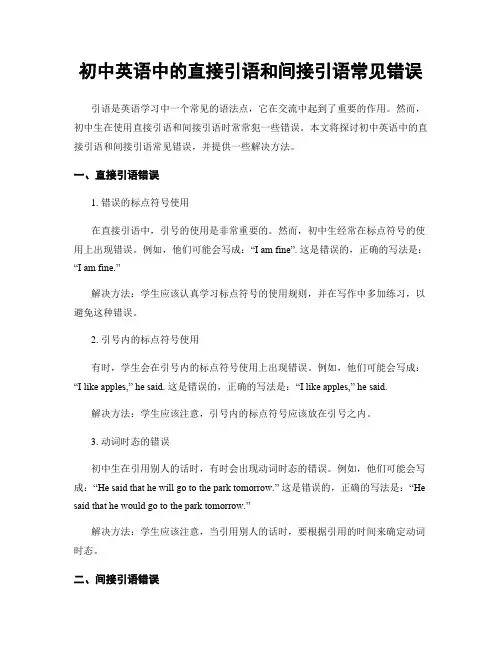
初中英语中的直接引语和间接引语常见错误引语是英语学习中一个常见的语法点,它在交流中起到了重要的作用。
然而,初中生在使用直接引语和间接引语时常常犯一些错误。
本文将探讨初中英语中的直接引语和间接引语常见错误,并提供一些解决方法。
一、直接引语错误1. 错误的标点符号使用在直接引语中,引号的使用是非常重要的。
然而,初中生经常在标点符号的使用上出现错误。
例如,他们可能会写成:“I am fine”. 这是错误的,正确的写法是:“I am fine.”解决方法:学生应该认真学习标点符号的使用规则,并在写作中多加练习,以避免这种错误。
2. 引号内的标点符号使用有时,学生会在引号内的标点符号使用上出现错误。
例如,他们可能会写成:“I like apples,” he said. 这是错误的,正确的写法是:“I like apples,” he said.解决方法:学生应该注意,引号内的标点符号应该放在引号之内。
3. 动词时态的错误初中生在引用别人的话时,有时会出现动词时态的错误。
例如,他们可能会写成:“He said that he will go to the park tomorrow.” 这是错误的,正确的写法是:“He said that he would go to the park tomorrow.”解决方法:学生应该注意,当引用别人的话时,要根据引用的时间来确定动词时态。
二、间接引语错误1. 代词的错误使用在间接引语中,学生有时会错误地使用代词。
例如,他们可能会写成:“She said that him is coming tomorrow.” 这是错误的,正确的写法是:“She said that he is coming tomorrow.”解决方法:学生应该熟悉代词的用法,并在写作中多加练习,以避免这种错误。
2. 时态的错误在使用间接引语时,学生有时会出现时态的错误。
例如,他们可能会写成:“He said that he will go to the park tomorrow.” 这是错误的,正确的写法是:“He said that he would go to the park the next day.”解决方法:学生应该注意,在使用间接引语时,要根据引用的时间来确定动词时态。
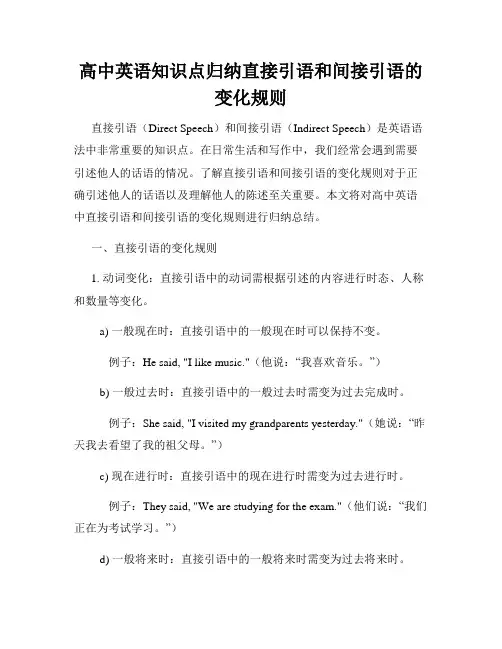
高中英语知识点归纳直接引语和间接引语的变化规则直接引语(Direct Speech)和间接引语(Indirect Speech)是英语语法中非常重要的知识点。
在日常生活和写作中,我们经常会遇到需要引述他人的话语的情况。
了解直接引语和间接引语的变化规则对于正确引述他人的话语以及理解他人的陈述至关重要。
本文将对高中英语中直接引语和间接引语的变化规则进行归纳总结。
一、直接引语的变化规则1. 动词变化:直接引语中的动词需根据引述的内容进行时态、人称和数量等变化。
a) 一般现在时:直接引语中的一般现在时可以保持不变。
例子:He said, "I like music."(他说:“我喜欢音乐。
”)b) 一般过去时:直接引语中的一般过去时需变为过去完成时。
例子:She said, "I visited my grandparents yesterday."(她说:“昨天我去看望了我的祖父母。
”)c) 现在进行时:直接引语中的现在进行时需变为过去进行时。
例子:They said, "We are studying for the exam."(他们说:“我们正在为考试学习。
”)d) 一般将来时:直接引语中的一般将来时需变为过去将来时。
例子:He said, "I will go to the cinema tomorrow."(他说:“明天我将去电影院。
”)2. 代词变化:直接引语中的人称代词(例如I、you、he、she、they 等)需按照引述者的身份进行变化。
例子:He said, "I am going to the park."(他说:“我要去公园。
”)3. 时间和地点变化:直接引语中的时间和地点词语需根据实际情境进行变化。
例子:She said, "I will meet you at the library tomorrow."(她说:“明天我会在图书馆见你。
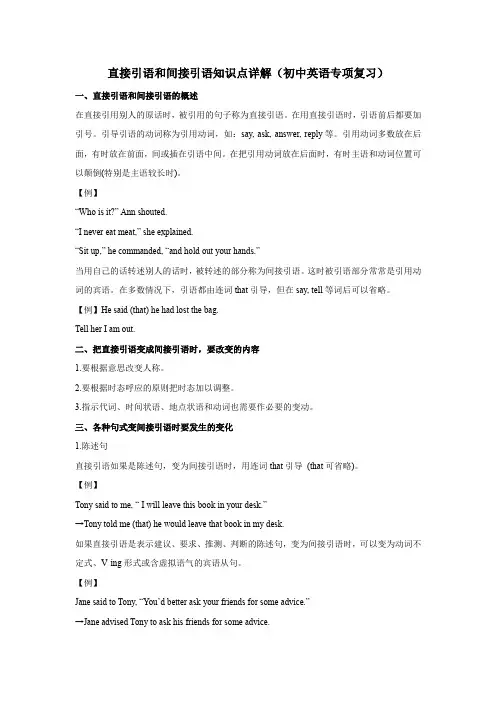
直接引语和间接引语知识点详解(初中英语专项复习)一、直接引语和间接引语的概述在直接引用别人的原话时,被引用的句子称为直接引语。
在用直接引语时,引语前后都要加引号。
引导引语的动词称为引用动词,如:say, ask, answer, reply等。
引用动词多数放在后面,有时放在前面,间或插在引语中间。
在把引用动词放在后面时,有时主语和动词位置可以颠倒(特别是主语较长时)。
【例】“Who is it?” Ann shouted.“I never eat meat,” she explained.“Sit up,” he commanded, “and hold out your hands.”当用自己的话转述别人的话时,被转述的部分称为间接引语。
这时被引语部分常常是引用动词的宾语。
在多数情况下,引语都由连词that引导,但在say, tell等词后可以省略。
【例】He said (that) he had lost the bag.Tell her I am out.二、把直接引语变成间接引语时,要改变的内容1.要根据意思改变人称。
2.要根据时态呼应的原则把时态加以调整。
3.指示代词、时间状语、地点状语和动词也需要作必要的变动。
三、各种句式变间接引语时要发生的变化1.陈述句直接引语如果是陈述句,变为间接引语时,用连词that引导(that可省略)。
【例】Tony said to me, “ I will leave this book in your desk.”→Tony told me (that) he would leave that book in my desk.如果直接引语是表示建议、要求、推测、判断的陈述句,变为间接引语时,可以变为动词不定式、V-ing形式或含虚拟语气的宾语从句。
【例】Jane said to Tony, “You’d better ask your friends for some advice.”→Jane advised Tony to ask his friends for some advice.→Jane suggested Tony asking his friends for some advice.→Jane advised/suggested that Tony (should) ask his friends for some advice.2.一般疑问句、选择疑问句和反意疑问句直接引语是一般疑问句,变为间接引语时,要用连词whether或if引导,同时把原来的疑问句语序变为陈述句语序。
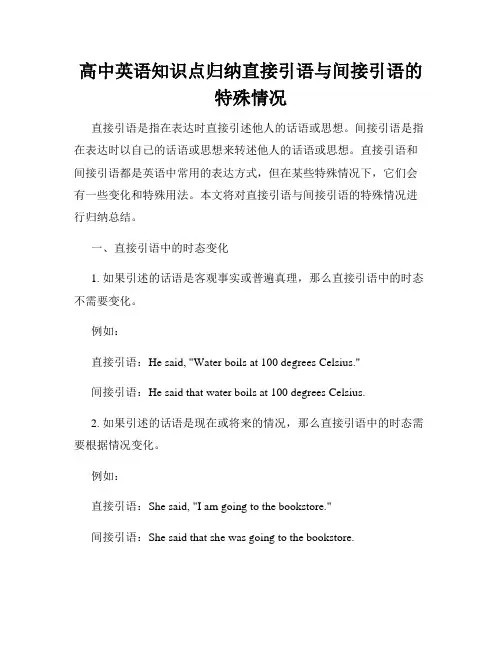
高中英语知识点归纳直接引语与间接引语的特殊情况直接引语是指在表达时直接引述他人的话语或思想。
间接引语是指在表达时以自己的话语或思想来转述他人的话语或思想。
直接引语和间接引语都是英语中常用的表达方式,但在某些特殊情况下,它们会有一些变化和特殊用法。
本文将对直接引语与间接引语的特殊情况进行归纳总结。
一、直接引语中的时态变化1. 如果引述的话语是客观事实或普遍真理,那么直接引语中的时态不需要变化。
例如:直接引语:He said, "Water boils at 100 degrees Celsius."间接引语:He said that water boils at 100 degrees Celsius.2. 如果引述的话语是现在或将来的情况,那么直接引语中的时态需要根据情况变化。
例如:直接引语:She said, "I am going to the bookstore."间接引语:She said that she was going to the bookstore.3. 如果引述的话语是过去的情况,那么直接引语中的时态需要回退一个时态。
例如:直接引语:He said, "I bought a new car."间接引语:He said that he had bought a new car.二、直接引语中的人称变化1. 如果直接引语中的第一人称变为间接引语中的第三人称,第二人称不需要变化。
例如:直接引语:He said, "I love you."间接引语:He said that he loved her.2. 如果直接引语中的第二人称变为间接引语中的第一人称,第一人称的人称代词需要根据情况变化。
例如:直接引语:She said, "You should study hard."间接引语:She told me that I should study hard.三、直接引语中的疑问句变化1. 如果直接引语是一般疑问句,那么间接引语中的句子结构和词序不需要变化,只需在引导词后加上原来的疑问词。
初中英语中的直接引语和间接引语常见问题直接引语和间接引语是初中英语中的重要知识点,也是学生们经常出现错误的地方。
在学习和掌握这两种引语的使用方法时,常见的问题主要包括:引号的使用、动词时态的转换、人称代词的变化以及疑问句和祈使句的转换等。
下面将逐一进行讨论。
首先,引号的使用是直接引语和间接引语的重要标志。
在直接引语中,我们需要使用引号将别人的话原封不动地引用出来。
例如,当别人说:“I like swimming.”时,我们需要将其转化为直接引语:“I like swimming.”。
而在间接引语中,我们则不需要使用引号,只需将别人的话转述出来即可。
例如,当别人说“I like swimming.”时,我们需要将其转化为间接引语,即“He said that he liked swimming.”。
在使用引号时,注意要将引号放在句子的首尾,并确保引号的类型一致,即使用双引号或单引号。
其次,动词时态的转换是直接引语和间接引语中常见的问题。
在直接引语中,我们需要将别人的话原封不动地引用出来,包括时态。
例如,当别人说:“I am reading a book.”时,我们需要将其转化为直接引语:“I am reading a book.”。
而在间接引语中,我们则需要根据引语所在的时间来决定时态的转换。
例如,当别人说“I am reading a book.”时,如果引语所在的时间是过去,我们需要将其转化为间接引语,即“He said that he was reading a book.”。
在进行时态转换时,注意要根据具体情况来决定动词的时态变化。
第三,人称代词的变化也是直接引语和间接引语中常见的问题。
在直接引语中,我们需要将别人的话原封不动地引用出来,包括人称代词的使用。
例如,当别人说:“I am happy.”时,我们需要将其转化为直接引语:“I am happy.”。
而在间接引语中,我们则需要根据引语所在的人称来决定人称代词的变化。
初中英语中的直接引语和间接引语用法在初中英语学习中,直接引语和间接引语是一个重要的语法知识点。
它们在口语和书面语中都有广泛的应用。
正确使用直接引语和间接引语不仅能够提升语言表达能力,还能够帮助我们更好地理解他人的意思。
下面将详细介绍直接引语和间接引语的用法。
直接引语是将别人的原话直接引用并用引号括起来。
当我们使用直接引语时,需要注意几个要点。
首先,引号的使用是必不可少的,它们用来标识出原话的范围。
其次,直接引语的标点符号需要放在引号内部。
最后,如果直接引语是一个完整的句子,那么首字母需要大写。
例如,当我们想表达“我喜欢看电影”时,可以直接引用别人的话说:“I like watching movies”。
间接引语是将别人的原话转述成自己的话。
与直接引语相比,间接引语需要进行一定的变化和调整。
首先,我们需要使用适当的动词来引导间接引语,如“say”、“tell”、“ask”等。
其次,间接引语通常以陈述句的形式出现,因此需要将原话转换成陈述句的语序。
最后,间接引语中的人称和时态也需要根据实际情况进行变化。
例如,当别人告诉我他喜欢看电影时,我可以转述成:“He told me that he likes watching movies”。
在实际应用中,直接引语和间接引语的使用是灵活多样的。
有时候,我们可以根据需要选择使用直接引语或间接引语。
例如,当我们想强调别人的原话时,可以使用直接引语。
而当我们想简洁地转述别人的原话时,可以使用间接引语。
此外,直接引语和间接引语也可以同时出现在一个句子中。
例如,当我们想告诉别人老师说过“我们需要更加努力学习”的话时,可以说:“The teacher told us, 'We need to study harder'”。
除了基本的用法外,直接引语和间接引语还有一些特殊的情况需要注意。
首先,当直接引语中包含疑问句、感叹句或条件句等特殊句型时,我们需要根据实际情况进行调整。
直接引语和间接引语(DirectSpeechandindirectSpeech)1直接引语:直接引述他人的原话,叫直接引语。
间接引语:用自己的话转述他人的话,叫间接引语。
间接引语在多半状况下组成宾语从句。
直接引语一般前后要加引号,间接引语不用引号。
比如:MrBlacksaid, “I'mbusy”布莱克先生说:“我很忙”(直接引语)MrBlacksaidthathewasbusy. 布莱克先生说他很忙。
(间接引语)1、直接引语假如是陈说句,变成间接引语时,用连词 that 指引(that在口语中常省略),从句中的人称、时态、指示代词、时间状语、地址状语等要作相应变化。
在这一方面,汉语和英语有很多相像之处,所以,在做直接引语和间接引语变换练习时,要特别注意句子的意义。
1)人称的变化a)Hesaid, “Ilikeitverymuch.”他说:“我特别喜爱它。
”Hesaidthathelikeditverymuch. 他说他特别喜爱它。
b)Hesaid tome, “I'veleftmybookinyour room.”他对我说:“我把书放在你的房间里了。
”Hetoldmethathehadlefthisbookinmyroom.他告诉我他把书放在我的房间里了。
2)时态的变化如主句的谓语动词是一般过去时,直接引语变间接引语时,从句的谓语动词在时态方面要作相应的变化。
如主句的谓语动词是此刻时,从句的时态则无需变化。
时态的变化例句直接引语间接引语一般此刻时→一般过去时Hesaid, “I'mafraidIcan'tfinishthiswork.”Hesaidthathewasafraidhecouldn'tfinishthatwork.此刻进行时→过去进行时Hesaid, “I'musingthe knife. ”Hesaidthathewasusingtheknife.此刻达成时→过去达成时Shesaid, “IhavenotheardfromhimsinceMay.”ShesaidthatshehadnotheardfromhimsinceMay.一般过去时→过去达成Hesaid, “Icametohelpyou.”Hesaidthathehadcometohelpme.过去达成时不变Hesaid, “Ihadfinishedmyhomeworkbeforesupper.”Hesaidthathehadfinishedhishomeworkbeforesupper.指示代词、时间状语、地址状语和动词的变化:变化例句直接引语间接引语this-that这个-那个Shesaid, “Iwillcomethismorning." Shesaidthatshewouldgothatmorning.these-those这些=那些Hesaid,"Thesebooksaremine."Hesaidthatthosebookswerehis.now-then此刻-那时Hesaid,"Itisnine0'clocknow."Hesaidthatitwasnine0'clockthen.today-thatday今日-那一天Hesaid,"Ihaven'tseenhertoday."Hesaidthathehadn'tseenherthatday.yesterday-thedaybefore昨天-前一天shesaid,"Iwentthereyesterday." Shesaidthatshehadgonetherethedaybefore.tomorrow-thenext(following)day明日-次日shesaid,"I'llgotheretomorrow." Shesaidthatshewouldgotherethenext(following)day.here-there这里-那边come-go来-去注:(1)直接引语假如是客观真谛,变成间接引语时,时态不变。
英语中的引语在英语中,引用别人的话或思想是一种常见的表达方式。
引语可以用来支持自己的观点、强调重点或者展示别人的观点。
以下是几种常见的引语类型:1. 直接引语(Direct quotes)直接引语是将别人的原话进行引用。
在引用时,需要用引号将原话包裹起来,同时需要注明出处。
例如:“I have a dream,” Martin Luther King Jr. once said.2. 间接引语(Indirect quotes)间接引语是将别人的话转述为自己的话。
在引用时,不需要使用引号,但需要注明出处。
例如:According to Martin Luther King Jr., he had a dream.3. 引用段落(Quotations)引用段落是将别人的文字进行引用。
在引用时,需要使用引号将文字包裹起来,并且需要注明出处。
如果引用的文字太长,可以将其缩写。
例如:In his famous letter from Birmingham Jail, Martin Luther King Jr. wrote, “Injustice anywhere is a threat to justice everywhere.”4. 双重引用(Nested quotes)双重引用是在引用中再次引用别人的话。
在引用时,需要使用不同的引号进行区分。
例如:As Martin Luther King Jr. once said, “Darkness cannot drive out darkness; only light can do that.Hate cannot drive out hate; only love can do that.” As Gandhi put it, “An eye for an eye will only make the whole world blind.”总之,引用可以帮助我们更好地表达自己的观点,同时也可以展示我们对别人观点的尊重和理解。
直接引语和间接引语知识点总结直接引语指的是直接引用他人的原话或言论,使用原文的具体表达和语气。
而间接引语则是通过自己的话来转述他人所说的内容。
在日常生活和学术写作中,我们经常会使用这两种引语形式来支持自己的观点和加强论证的力度。
以下是对直接引语和间接引语的知识点进行总结和归纳:1. 用引号标记直接引语在引用他人的原话时,直接将其放入引号中。
引号的使用方式有时根据语言习惯而有所不同。
例如,在英语中,使用双引号("")标记直接引语,而在中文中,则多使用单引号('')或直接将引语括起来。
例如:直接引语(英语):He said, "I am going to the park."直接引语(中文):他说:“我要去公园。
”2. 引用位置和标点符号引用的位置和标点符号的使用是关键。
在引用长句或段落时,通常将引号放在开头,句末的标点符号也放在引号内部。
而对于短句或片段,引号则放在句尾。
例如:长句引用:The author writes, "The success of a project depends on proper planning and execution."; (句末的分号放在引号内)短句引用:He simply said, "I agree."; (引号放在句尾)3. 引文中的引文在引用中存在引文的情况下,可以使用单引号作为引用内的标记。
例如:原句:He said, "I remember her exact words were, 'I will be there for you.'"直接引语:He said, "I remember her exact words were, 'I will be there for you.'"4. 间接引语的转述技巧间接引语并不直接使用原文的措辞,而是使用自己的话进行转述。
9A Unit 6英语语法———直接引语变为间接引语(宾语从句)一、直接引语变成间接引语的几个例子:⑴The teacher told us, “The earth is round.”The teacher told us (that) the earth is round.(2)Tom said to me yesterday, “ I like reading books.”Tom told me yesterday (that) he likes reading books.⑶Lily told me, “ I want to go shopping.”Lily told me (that) she wanted to go shopping.※※※※※※※※※※※※※※※※※※※※※※※※※※※※※※※※※※※※※※※※(4) He asked me ,“who is the woman ?”He asked me who the woman was .(5) I asked Tom, “ Where does John live?“I asked Tom where John lived.※※※※※※※※※※※※※※※※※※※※※※※※※※※※※※※※※※※※※※※※(6)I asked Lucy, “Are you watching TV?”I asked Lucy if she was watching TV .(7)He asked me, “Do you have any paper?”He asked me if I had any paper.二、根据以上的例子归纳1.宾语从句定义:宾语从句是指在复合句中主句的宾语由一个完整的句子来充当,这个句子叫宾语从句。
2直接引语改为间接引语(宾语从句)的方法:(特别要注意时态、语序、人称变化三个方面...................)①陈述句作宾语从句常由that来引导,口语中that常省略)(如(1)(2)(3))②特殊疑问句作宾语从句常由特殊疑问词(who/what/where等)来引导,而且必须用陈述句语序。
直接引语间接引语讲解及练习 引述别人的话时,一般采用两种方式:一是引用别人的原话,把它放在引号内,称为直接引语;二是用自己的话加以转述,被转述的话不放在引号内,称为间接引语。间接引语在大多数情况下是一个宾语从句。直接引语变成间接引语时,要注意以下几点:人称变化、时态变化、宾语从句要用陈述句语序等。 1. 直接引语是陈述句,变成间接引语时,由连词that 引导。例如: She said, “I am very happy to be with you.” →She said (that) she was very happy to be with me. He said,“I will choose a book for my students.” →He said(that)he would choose a book for his students. 2. 直接引语是一般疑问句时,变成间接引语,由连词whether或if 引导。例如: He asked me, “Do you like watching TV?”→He asked me if/whether I liked watching TV. He asked, “Are you sure your mother will come?”→He asked me whether / if I was sure my mother would come. *注意:大多数情况下, if和whether 在引导宾语从句时可以互换,但后紧跟or not时,一般只用whether。例如:She asked me whether or not he could do the work. / She asked me whether he could do the work or not. 3. 直接引语是特殊疑问句,变成间接引语时,由相应的连接词who, whom, what, whose, how, when, why, where 等引导。例如: He asked: “Where are you to get off, John?” →He asked John where he was to get off. My sister asked me, “How do you like the play?”→My sister asked me how I liked the play. Tom asked me, “Who is the boy over there?”→Tom asked me, “Who was the boy over there?” 4. 直接引语是祈使句,其间接引语由主语+动词ask(委婉语气),tell(一般语气),order (命令语气)或warn, advise等+复合宾语(名/代词+动词不定式)构成。如: He said, “Please come here again tomorrow.”→He asked me to go there again the next day. “Be careful with the dog.”→He warned me to be careful with the dog. 5. 直接引语变间接引语时,如果引述动词为过去式,需注意时态的变化:如: 1) Betty said, “Lingling is singing in the classroom now.” 现在进行时→ Betty said Lingling was singing in the class room then.-过去进行时 2) He said, “I will go to London next week.” 一般将来时→ He said he would go to London next week. 过去将来时 3) My mother said, “I have already cleaned the house.” 现在完成时→ My mother said she had already cleaned the house. 过去完成时 *注意: 1. 直接引语是客观事实、普遍真理等,主句尽管是过去时态,变成间接引语时,时态仍然用一般现在时态。 例如:They told their son,“The earth goes round the sun.”→They told their son that the earth goes round the sun. 2. 直接引语变间接引语时, 指示代词、时间状语、地点状语、动词等要作相应的变化。 如:this→that, these→those, now→then, today→that day, yesterday→the day before, last year→the year before, ago→before, here→there ,come→go,tomorrow→the next day,next month→the month after,last year→the year before,a week ago→a week before,bring→take,now→then,the day after tomorrow→in tow day's time,the day before yesterday→tow days before earlier 例如:He said, “I haven’t seen them today.” →He said that he hadn’t seen them that day. 但是,如果转述时对话人双方就在原来的地方,或在说话的当天,就不必改变相应的时间状语、地点状语等。总之,对这些变化不能机械理解,应根据实际情况来决定所作的变化。 3.情态动词的变化 情态动词在间接引语中都可以改为过去式,must表示必、推测、禁止等意思时,可不变;表示必须时可不变,也可用had to 或would have to。 如:The senior said, All men must die. → The senior said that all men must die. 那老者说人总是要死的。 She said, I must go to see the doctor tomorrow afternoon. → She said she would have to go to see the doctor the next afternoon. 她说第二天下午她一定得去看医生。 He said to me, We used to go there every year. → He told me that they used to come here every year. 他对我说他们过去每年都来这里。(used to在间接引语中不变) 4.人称代词的变化 ①当主句的主语是第一人称时,引语中的人称代词不变。 如:I said, You did quite well in the exam yesterday. → I said that you had done quite well in the exam the day before.我说你那天考得不错。 ②直接引语中主语是第一人称时,在改为间接引语时,其人称与主句中的主语的人称一致。 如:He said to Tom, I'll do my best to catch up with others. → He told Tom that he would do his best to catch up with others. 他告诉汤姆他将尽他所能赶上其他人。③直接引语中主语是第二人称时,在改为间接引语时,其人称和主句的宾语相一致。 如:He said to her, Where did you put the glasses → He asked her where she had put the glasses. 他问她,她把杯子放哪儿了。 ④直接引语中主语是第三人称时,在改为间接引语时不发生变化。 如:He said to Tom, She can help them. → He told Tom that she could help them. 他告诉汤姆她能够帮助他们。 5.物主代词的变化 如:You should not overlook your fault, Mum said to me. → Mum told me that I should not overlook my fault. 妈妈对我说我不应该忽略我的缺点。 The two boys said, We have lost ur dog. → The two boys said they had lost their dog. 这两个男孩说他们的狗丢了。 练习 一.按照要求改句子: A.把下列的直接引语句子改为间接引语的句子: 1. The students said: “We can look after ourselves.” 2. Dennis said: “I have to talk about it on the phone.” 3. The headmaster said: “There will be less pollution in our school next year.” 4. Lana said: “There is no air Or water on the moon.” 5. Alexis said: “I work as a part-time assistant in a bookshop.” 6. Peter said to me: “I don’t want to surprise you.” 7. Allan told us: “My dream will come true.”